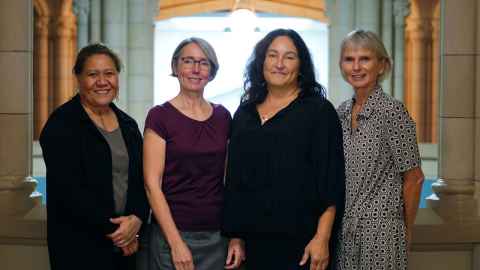Why familiar spaces are so important
2 May 2024
Opinion: The University of Auckland’s four Pro Vice-Chancellors outline why the University's support networks for diverse groups are so vital to academic success.

In March, a temporary sign identifying a space used by Māori students and Pacific students was described by political leaders as segregation.
This uninformed claim resulted in real harm, including triggering abuse and death threats directed at our students and staff. While the news cycle has moved on, these events show up the need for better understanding about why such spaces exist in our University.
There are many reasons for having spaces dedicated to specific groups and activities. Some of these reasons relate to the University’s rights and responsibilities under te Tiriti and various pieces of legislation. Others relate to the University’s responsiveness to the diverse interests and needs of our students. It’s entirely appropriate to have spaces set aside for different groups, and bathrooms organised by gender are a commonplace example. We proudly provide our community of 46,000 students with tailored facilities and support, such as parenting rooms, prayer spaces, and low-sensory environments for neurodiverse people, for example.
The University also has spaces for Māori and Pacific students, where they can freely express themselves and their cultures in an academic setting. This is where students can find familiarity, socialise, study and connect, creating a sense of belonging that enables them to thrive. These spaces are an essential ingredient in the University’s Tuākana programme, which is an education community open to all Māori and Pacific students and staff. This programme has for decades enabled Māori students and Pacific students to make the most of their opportunities during their time at University. It provides culturally tailored support that can make all the difference for their educational achievements and future opportunities.
Equity recognises people’s individual circumstances and that fair treatment might involve different levels of support and resources to help ensure everyone has what they need to thrive.
Is it reverse racism to provide spaces for Māori and Pacific students? No.
Supporting people who are disadvantaged by racism is not racism. Good faith measures that assist those disadvantaged by discrimination are not discriminatory. This is not just morally self-evident, it’s also provided for in the Bill of Rights Act and the Human Rights Act. However, a group of people receiving support is sometimes interpreted by others as a loss of something that is rightfully theirs. This sense of loss and resulting grievance indicates a misunderstanding about the differences between equality and equity.
Equality means giving everyone the same thing, without discrimination. This sounds desirable at first, until you realise that it doesn’t take into account differences in people’s circumstances and backgrounds, or systemic barriers that prevent people from accessing the resources, opportunities, and life chances on offer.
Equity recognises people’s individual circumstances and that fair treatment might involve different levels of support and resources to help ensure everyone has what they need to thrive. Equity also seeks to level the playing field for groups who are disadvantaged by historical injustices and ongoing contemporary problems such as racism, sexism, and ableism. Equitable policies and practices promote fairness for both individuals and communities, in ways that ultimately benefit everyone.
Providing tailored support for Māori students and Pacific students is one of many ways the University recognises the specific needs of students and promotes equitable experiences and success. We are unapologetic and unwavering in our commitment to upholding the mana of Māori and Pacific students and staff. As the University’s Pro Vice-Chancellors, we are working together, with our colleagues, to create an environment of mutual respect where people can thrive with a secure sense of belonging.
Written by Associate Professor Te Kawehau Hoskins, Pro Vice-Chancellor Māori; Professor Jemaima Tiatia-Siau, Pro Vice-Chancellor Pacific; Professor Cathy Stinear, Pro Vice-Chancellor Equity; and Professor Bridget Kool, Pro Vice-Chancellor Education.
The views in this article are those of the authors who support the position taken by the University on this matter.
This opinion piece was first published in UniNews May 2024.